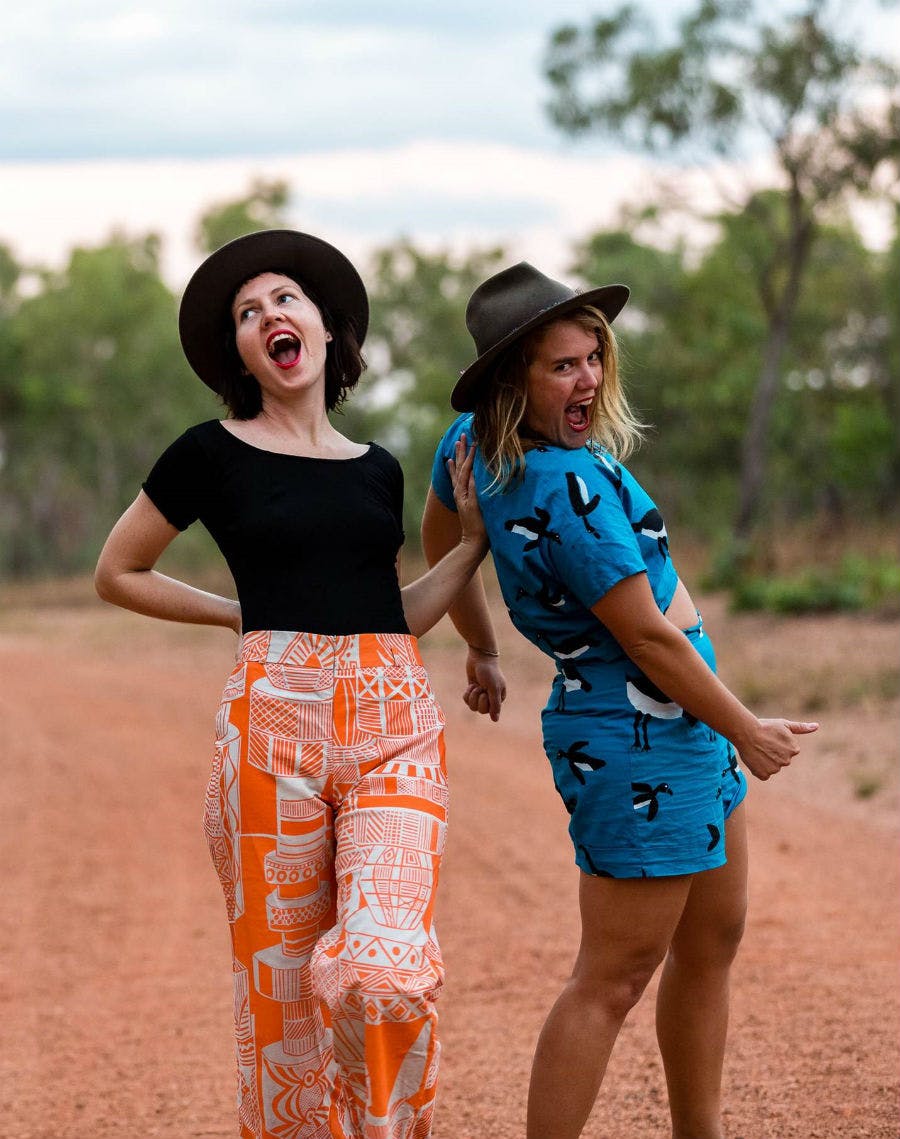The power of the Internet to connect regional women is alive and well.
Case in point: thriving clothing enterprise Magpie Goose, which got its start through a Kickstarter campaign.
Kickstarter, a popular crowdfunding site, helps promising entrepreneurs with an idea to get that idea off the ground and to the market. Maggie McGowan, the generator behind the Magpie Goose vision, initially started the Kickstarter campaign aiming to raise $20,000 for the project. Ultimately, she ended up gathering more than $100,000 to support her business---the first $20,000 being raised in just one day. This is a winning testament to the ways in which the Internet has transformed the business world, and it is an especially stirring reminder of the benefits of connectivity for Regional Australia and its residents.
A History and a Vision
Magpie Goose is known for their loud, vibrant prints in brilliant colours, a style which is perhaps the perfect reflection of their name. (The Magpie Goose is a bird native to Northern Australia that gathers in sizeable and noisy flocks). It is a name well befitting a bold fashion brand.
Magpie Goose was founded by Maggie McGowan, a former lawyer. McGowan attended the University of Melbourne, studying Law and Politics, prior to relocating in 2013 to the Northern Territory. There, she worked for several years with the North Australian Aboriginal Justice Agency (NAAJA). In her role as a Welfare Rights and Civil Lawyer, McGown travelled frequently to remote communities throughout Australia, working to assist Aboriginal people with their legal needs.
These visits to remote communities introduced McGowan to the magic of Aboriginal art. During her travels, she often stopped into community art centres, and there she fell in love with the works, particularly with the array of textiles that were being designed and screen-printed by hand. These beautiful pieces were bright and colourful, and served as a tactile, joyous celebration of Aboriginal people and culture. “These fabrics just seemed to tell a story in a modern way that I really loved," McGowan says.
Combining her appreciation for the textiles with the understanding gleaned through legal work in Aboriginal communities, an idea was sparked within McGowan. She had worked often with impoverished and disenfranchised individuals in various communities, and this pointed the way for the value of generating income through creative work. Her spark of an idea eventually became Magpie Goose, a business designed not only to link the world to Aboriginal culture and art, but to provide economic opportunities for these Aboriginal communities.
She partnered up with Laura Egan, who would become Magpie Goose’s co-founder. Egan is well-educated in both Indigenous Studies and Economics and International Relations, having studied at Deakin University and James Cook University. Egan brought the perfect counterpoint to McGowan’s experience for this project. As CEO and Founder of an incubator known as Enterprise Learning Projects, Egan saw right away the potential benefits for the Aboriginal communities. The focus of Enterprise Learning Projects is to partner with remote Aboriginal communities to explore ways that enterprise can help to produce meaningful income for the communities, as well as celebrate and recognise the indigenous culture. Magpie Goose grew up under the guidance of this incubator, and it has indeed become a place that fulfils both of those aims. The clothing is popular for its exciting and fun prints, leading to significant sales. At the same time, the prints help to exhibit the rich stories of landscapes, ceremonies, seasons, and more within Aboriginal art and culture.

Magpie Goose co-founders, (from left) Laura Egan and Maggie McGowan
A Truly Regional Business
Magpie Goose is based out of Katherine, NT. While this area has not commonly been known as an entrepreneurial haven, Magpie Goose is helping to change that. Laura Egan, McGowan’s business partner (and an inspiring regional woman in her own right) has said, “Katherine is an unlikely place for a fashion label to launch, but we are really excited about building Katherine as a startup community.” The women are confident that this is a solid step forward for creative entrepreneurship in the NT.
At the start, Magpie Goose received prints from four community art centres (Gunbalanya, Wadeye, tiwi and Maningrida), but have since started working with other remote art centres across Northern Australia, as well as some artists who do not have art centres in their community. Since November 2017, Magpie Goose clothing has been 100% Australian made. While the screen-printed fabrics come from the Top End, the clothing is then cut and sewn in Sydney, transforming into shirts, pants, dresses, and more.
The communities are growing increasingly excited about the possibilities, too. In this article from ABC, Aboriginal artist Margaret Duncan said, “I'm really proud of how we can do things because we have a good talent to do, and there's a lot of Aborigine people out there have the skill to do it.” With more orders coming in, and money being made, other people want to join in and become a part of the enterprise.
Building a Thriving Business
There’s no doubt that the Internet has been instrumental in growing the business. Not only did the enterprise fully emerge through a Kickstarter campaign, McGowan uses the site and social media to spread the word. Sharing updates and photos across a social community of nearly 20,000 keeps customers and fans up-to-date on the latest from Magpie Goose. Recently, they’ve been using Facebook to let people know about various “pop-ups” around the country: opportunities for those in different parts of Australia to see and try on the garments.
Wherever it goes, this socially-inclusive, non-profit fashion label gets attention. McGowan has told stories of people calling to her across the street to ask about her vivid-coloured clothing, or even running after her in airports. “I don’t have a background in fashion,” she says, “I just love the prints and the stories they tell, it is a modern and easy way for people to get a better understanding of Aboriginal culture.”